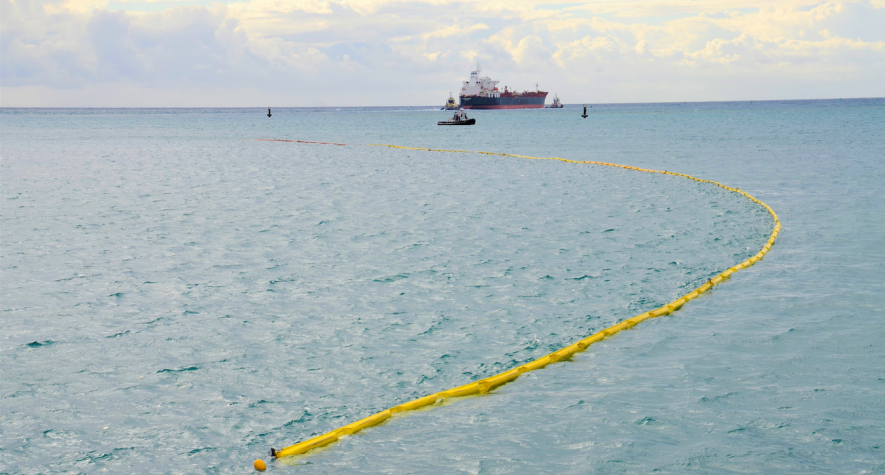A Leaking Oil Refinery on St. Croix Gives Biden His First Environmental Justice Test

A Leaking Oil Refinery on St. Croix
A controversial oil refinery on St. Croix, one of the U.S. Virgin Islands, is in the government’s crosshairs after a third incident in just three months has sickened people. On May 5, after gaseous fumes were released from one of the oil refining units of Limetree Bay Refining, residents of the unincorporated Caribbean territory reported a range of symptoms, including burning eyes, nausea and headaches, with at least three people seeking medical attention at the local hospital. At its peak in 1974, the facility, which opened in 1966, was the largest refinery in the Americas, producing some 650,000 barrels of crude oil a day. It restarted operations in February after being shuttered for the past decade.
A Limetree spokesperson said that there was a release of “light hydrocarbon odors” resulting from the maintenance on one of the refinery’s cokers, high heat level processing units that upgrade heavy, low-value crude oil into lighter, high-value petroleum products. The noxious odor stretched for miles around the refinery, remaining in the air for days and prompting the closure of two primary schools, a technical educational center and the Bureau of Motor Vehicles (BMV), which local officials said was shuttered because its employees “are affected by the strong, unpleasant gas like odor, in the atmosphere.”
Limetree and the U.S. government conducted their own air quality testing, with different results. The National Guard found elevated levels of sulfur dioxide, while the company said it detected “zero concentrations” of the chemical just hours later. “We will continue to monitor the situation, but there is the potential for additional odors while maintenance continues,” said Limetree, which is backed by private equity firms EIG and Arclight Capital, the latter of which has ties to former President Donald Trump. “We apologize for any impact this may have caused the community.”
The May 5 incident follows two similar incidents in April at the refinery that the Virgin Islands Department of Planning and Natural Resources (DPNR) concluded were caused by the emission of excess sulfur dioxide from the burning of hydrogen sulfide, one of the impurities in petroleum coke, a coal-like substance that accounts for nearly a fifth of the nation’s finished petroleum product exports, mainly going to China and other Asian nations, where it is used to power manufacturing industries like steel and aluminum. Days after the U.S. Environmental Protection Agency (EPA) told the company that it was violating the Clean Air Act after the April incidents, Limetree agreed to resume sulfur dioxide monitoring, while contesting the violation. “If EPA makes a determination that the facility’s operations present an imminent risk to people’s health, consistent with its legal authorities, it will take appropriate action to safeguard public safety,” the agency said in a statement. The Biden EPA withdrew a key federal pollution permit for Limetree on March 25, but stopped short of shutting down the facility altogether.
Care2 has launched a public petition—already signed by more than 98,000 people—urging President Biden to shut down the Limetree Bay Refining facility. The petition also notes the risk that the refinery poses to the island’s biodiverse wildlife, saying that “turtles, sharks, whales, and coral reefs… [are] threatened by the Limetree Bay Refining plant—both by what it’s done in the past, and by what it’s spewing right now.” The group also frames the human rights and environmental justice aspect of the ongoing public health situation on the island in historical terms: “On top of the obvious problem that no person should be poisoned with oil, St. Croix is an island with a highly disenfranchised population. The vast majority of residents are Black, the [descendants] of enslaved Africans brought to work on sugar and cotton plantations. For generations, the U.S. government has cared little about the well-being of people there.” (One recent example happened in the wake of Hurricanes Irma and Maria, which landed on the island in September of 2017. Even two months after the storms hit, many residents of St. Croix who were evacuated to Georgia were unable to return home, and felt abandoned by the government. “I feel like we are the forgotten people and no one has ever inquired how do we feel,” said one of the St. Croix evacuees at the time.)
After the May 5 incident, Limetree said, “Our preliminary investigations have revealed that units are operating normally.” Perhaps it is normal for such facilities to emit toxic fumes. But what’s not normal is the fact that such fumes should present a constant threat to people and the environment, and that, according to the environmental group Earthjustice, about 90 million Americans live within 30 miles of at least one refinery. Adding insult to injury is the fact that Black people are 75 more likely to live near toxic, air-polluting industrial facilities, according to Fumes Across the Fence-Line, a report produced by the NAACP and the Clean Air Task Force, an air pollution reduction advocacy group. That report also found that more than 1 million African Americans face a disproportionate cancer risk “above EPA’s level of concern” due to the fact that they live in areas that expose them to toxic chemicals emanating from natural gas facilities.
You don’t need to live next door to a refinery to feel its impact on your health; in fact, you can be several miles away. A study conducted last year by researchers at the University of Texas Medical Branch (UTMB) found an increased risk of multiple cancer types associated with living within 30 miles of an oil refinery. “Based on U.S. Census Bureau data, there are more than 6.3 million people over 20 years old who reside within a [30-mile] radius of 28 active refineries in Texas,” said the study’s lead author, Dr. Stephen B. Williams, chief of urology and a tenured professor of urology and radiology at UTMB. “Our team accounted for patient factors (age, sex, race, smoking, household income and education) and other environmental factors, such as oil well density and air pollution and looked at new cancer diagnoses based on cancers with the highest incidence in the U.S. and/or previously suspected to be at increased risk according to oil refinery proximity.”
In granting Limetree’s permit in 2018—a move that E&E News reported was made to “cash in on an international low-sulfur fuel standard that takes effect in January [2020]”—Trump’s EPA said that the refinery’s emissions simply be kept under “plantwide applicability limit.” But then in a September 2019 report on Limetree—which has been at the center of several pollution debacles and Clean Air Act violations for decades—the agency said that “[t]he combination of a predominantly low income and minority population in [south-central] St. Croix with the environmental and other burdens experienced by the residents is indicative of a vulnerable community,” and added the new requirement of installing five neighborhood air quality monitors. “[G]iven several assumptions and approximations… and the potential impacts on an already overburdened low income and minority population, the ambient monitors are necessary to assure continued operational compliance with the public health standards once the facility begins to operate,” the agency stated. Limetree has appealed this ruling with the EPA’s Environmental Appeals Board, arguing that “the EPA requirements are linked to environmental justice concerns that are unrelated to operating within the pollution limits of the permit.”
“It is unclear when the EPA’s appeals board will rule on the permit dispute. The Biden-run EPA could withdraw the permit, and it is also reviewing whether the refinery is a new source of pollution that requires stricter air pollution controls,” reports Reuters, adding that the White House declined to comment.
President Biden has made environmental justice a central part of his policy, including the overhaul of the EPA External Civil Rights Compliance Office, which is responsible for enforcing civil rights laws that prohibit discrimination on the basis of race, color, national origin, sex or disability. “For too long, the EPA External Civil Rights Compliance Office has ignored its requirements under Title VI of the 1964 Civil Rights Act,” states Biden’s environmental justice plan. “That will end in the Biden Administration. Biden will overhaul that office and ensure that it brings justice to frontline communities that experience the worst impacts of climate change and fenceline communities that are located adjacent to pollution sources.”
Now it is time for Biden to make good on his campaign promise. John Walke, senior attorney and director of clean air programs with the Natural Resources Defense Council, told Reuters in March that the situation in St. Croix “offers the first opportunity for the Biden-Harris administration to stand up for an environmental justice community, and take a strong public health and climate… stance concerning fossil fuels.”
Earth | Food | Life contributor Sharon Lavigne has previously written about a similar issue in another region before. Lavigne is the founder and president of RISE St. James, a grassroots faith-based organization dedicated to opposing the siting of new petrochemical facilities in a heavily industrialized area along the Mississippi River between Baton Rouge and New Orleans known as “Cancer Alley.” Writing in Truthout in October 2020 about St. James Parish, Louisiana, the predominantly Black and low-income community where she lives, Lavigne pointed out that “Democratic presidential nominee Joe Biden mentioned St. James Parish in his clean energy plan speech because we’re notorious for having the country’s highest concentration of chemical plants and refineries, [one of] the highest cancer rates, the worst particulate pollution and one of the highest mortality rates per capita from COVID-19 in the nation,” She added, “For those of us living here, it’s not just Cancer Alley; it’s death row.”
The stated mission of the EPA is “to protect human health and the environment.” When so many Americans face a disproportionate cancer risk simply by living near toxic industrial sites such as oil and gas refineries, the EPA is derelict in its duty. The Limetree Bay Refining facility has presented President Biden with an early test of his commitment to environmental justice. Considering the facility’s terrible legacy of ecological and civil rights violations, three new public health incidents in just the past two months, and the disproportionate and ongoing health risks faced by the community’s predominantly Black and low-income population, it is finally time for the federal government to revoke Limetree’s license to operate on St. Croix. This is a perfect chance for President Biden to show the country and the world just how serious he is about environmental justice.
Reynard Loki is a writing fellow at the Independent Media Institute, where he serves as the editor and chief correspondent for Earth | Food | Life. He previously served as the environment, food and animal rights editor at AlterNet and as a reporter for Justmeans/3BL Media covering sustainability and corporate social responsibility. He was named one of FilterBuy’s Top 50 Health & Environmental Journalists to Follow in 2016. His work has been published by Yes! Magazine, Salon, Truthout, BillMoyers.com, AlterNet, Counterpunch, EcoWatch and Truthdig, among others.
This article was produced by Earth | Food | Life, a project of the Independent Media Institute.
Get the latest reports & analysis with people's perspective on Protests, movements & deep analytical videos, discussions of the current affairs in your Telegram app. Subscribe to NewsClick's Telegram channel & get Real-Time updates on stories, as they get published on our website.























